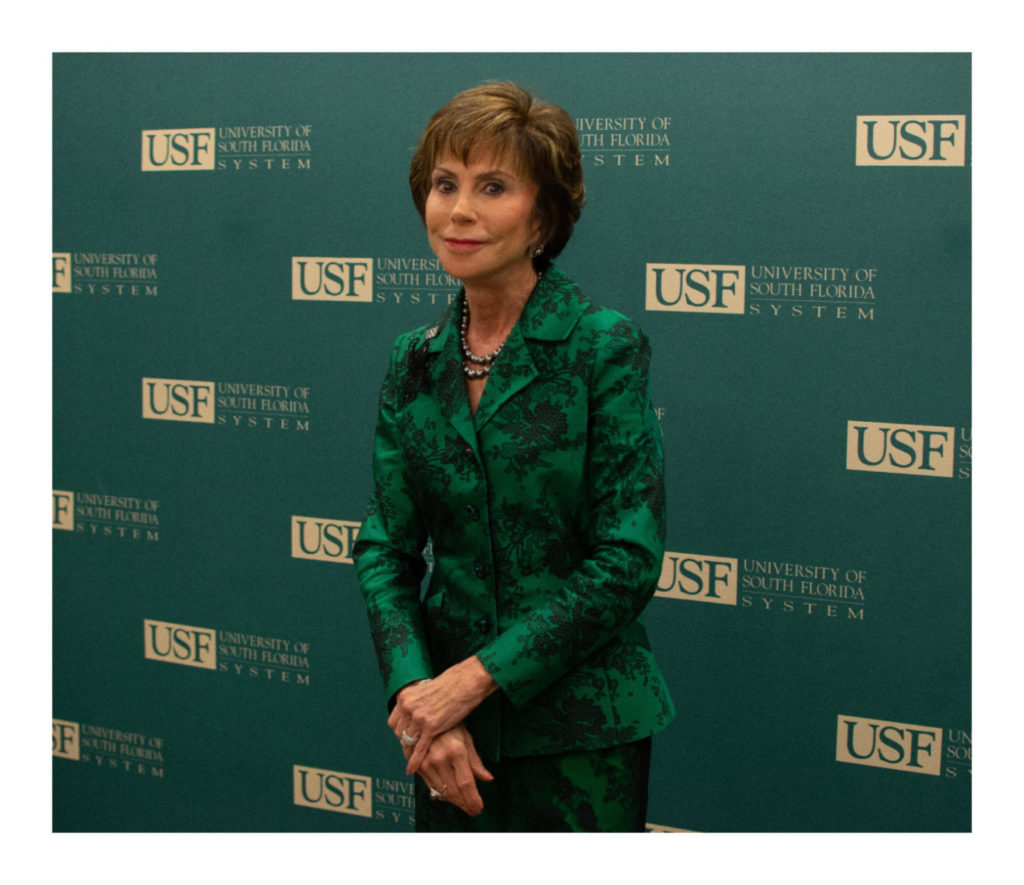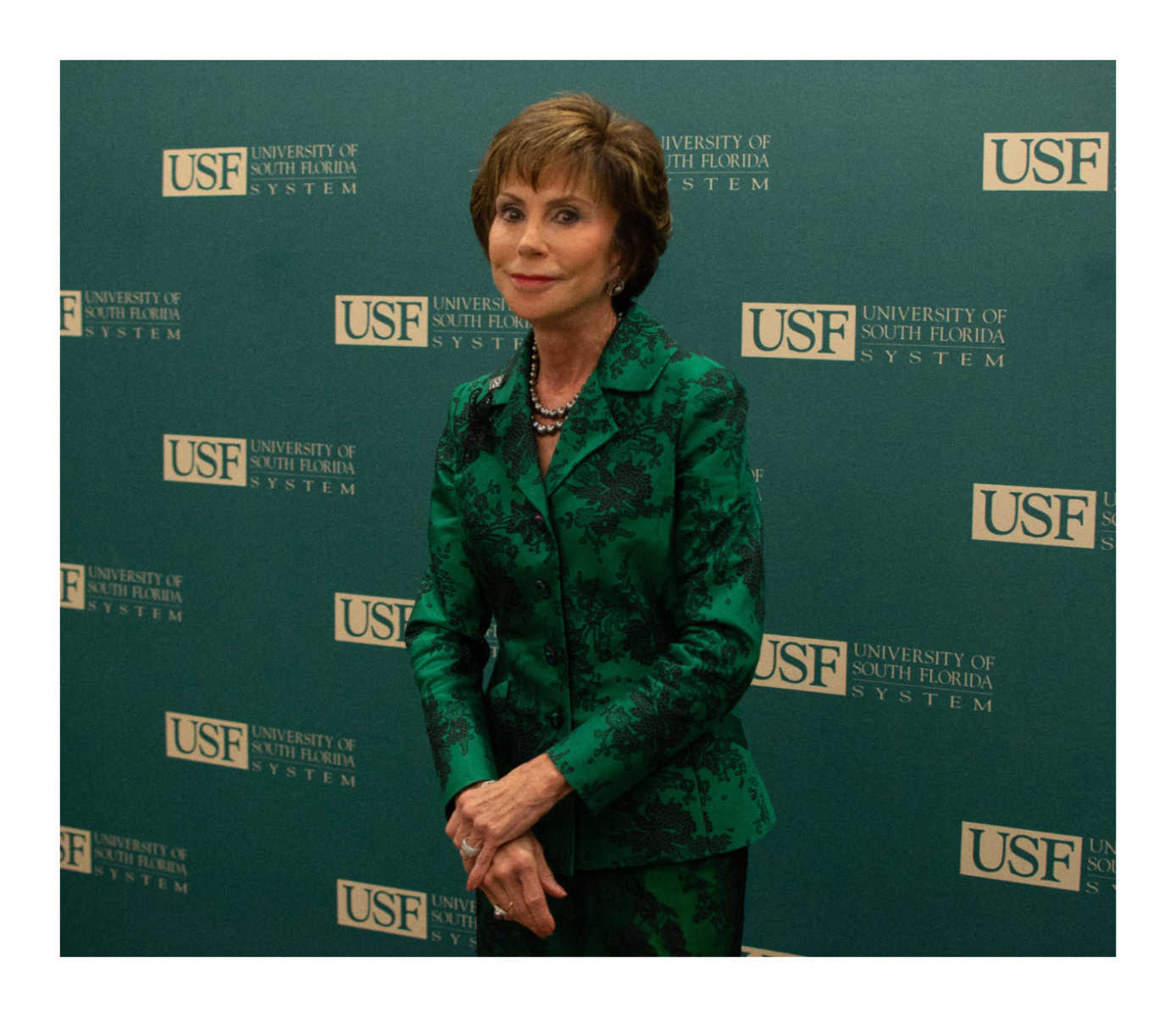
By Nancy McCann and Amy Diaz
Seeking to allay the concerns of St. Petersburg faculty, USF system President Judy Genshaft says it “clearly has not been decided” how the campus will be structured when it is folded into a consolidated USF.
Fears that St. Petersburg and Sarasota-Manatee will become “instructional sites” rather than “branch campuses” are premature, Genshaft said in an interview with The Crow’s Nest on Jan. 24.
The decisions on the organizational structure of the three campuses will be made by the USF system’s Board of Trustees, and then voted on by the Florida Board of Governors, which oversees all the universities in the state system, Genshaft said.
Asked what she would tell St. Petersburg faculty who are worried that their campus will become an instructional site, Genshaft said: “I’m listening. Right now, we’re all listening.”
A few minutes after the conclusion of the interview, Genshaft added to her comments.
“Ambiguity leads to anxiety,” she said. “We are trying to get clarity.
“It doesn’t have to be 100 percent a branch campus or an instructional site. It can have a mixture of elements that are unique to our system and accomplish what is needed for students and faculty.”
Genshaft’s remarks came shortly after the St. Petersburg Campus Board heard history professor Ray Arsenault say that consolidation “has turned our world upside down as (USF St. Petersburg) faculty members.”
“I would say the center of the crisis is the possibility that we would be classified … as an instructional site as opposed to a branch campus,” said Arsenault, who is president of USF St. Petersburg’s Faculty Senate.
“I think if you polled the faculty here you would find that the vast majority would feel that the instructional site designation would be catastrophic for us.”
If St. Petersburg has little control and becomes an instructional site without budgetary and hiring authority, he said, the “face-to-face, flesh-and-blood culture” that students and faculty love about the campus would be in danger.
Stephanie Goforth, who is chair of the Campus Board and a member of the Board of Trustees, was the first to respond to Arsenault.
“Let me just reassure you that we take this very seriously also and that we will get through this,” she said. “What we are focusing on as the Board of Trustees is really the very best thing for the students and how we make sure that it’s going to be exactly what is in their best interests.”
Board member Susan Churuti agreed with Arsenault that St. Petersburg should be a branch campus. Once a determination has been made, she said, the Campus Board could be a “sounding board” for faculty or “offer some pathway to achieving the appropriate designation” during the 2019 legislative session.
Arsenault replied, “I think our worry is that we don’t make our voice heard before the decisions are made.”
Board member Judy Mitchell asked Arsenault if he felt the consolidation planning process has been transparent.
“It’s hard to know what’s really driving the equation; it’s a giant Rube Goldberg machine,” replied Arsenault.
“We’ve spent so much time creating good curriculum and good administrative practices. To think we have to go back to the drawing board and adjust everything, whether it’s been transparent or not, it’s just been exhausting.”
In an interview with The Crow’s Nest a day after the Campus Board meeting, Arsenault said he thought Goforth had good intentions but missed the mark.
“Stephanie Goforth’s heart was in the right place, but when she said it’s all about the students … it’s like saying we don’t really care that much about the faculty,” said Arsenault.
“It’s a mantra that is used. I think it’s an oversimplification that sounds good but is not quite on point.
“It’s not all about the students, just as in families it’s not really all about the kids – it’s also about the parents. To me, it’s about the entire family. Saying it’s all about the students is a way of muting the faculty voice.”
Arsenault said he will not be able to attend the meeting this week of the USF Consolidation Task Force in Tampa, where the main item of business will be a “final deliverable discussion.”
The task force’s draft final report includes a recommendation that St. Petersburg and Sarasota-Manatee be designated as branch campuses.
But when that same recommendation was presented to the task force by one of its subcommittees in late November at a meeting in Sarasota, chairman Jonathan Ellen – who has since resigned — seemed to go out of his way to downplay the branch campus designation.
“I think that still needs to be played out,” he said.
Chris Steinocher is president and CEO of the St. Petersburg Area Chamber of Commerce and a frequent advocate for USF St. Petersburg.
In an interview with The Crow’s Nest, he said he thinks designating the smaller campuses as instructional sites would be “going backwards in time” and inconsistent with the state legislation and promises that were made for consolidation.
“If they’re looking for what’s best for students and our community, we’re hoping for the branch campus model,” he said.
The task force, now led by Mike Griffin, a former chair of the Greater Tampa Chamber of Commerce, is scheduled to meet at 1:30 p.m. on Jan. 29 at TECO Hall on the USF Tampa campus.
Meanwhile, three members of the university’s Retired Faculty and Staff Association warned that making the campus an instructional site would be a return to an unhappy yesteryear.
“I and so many of the senior faculty at USFSP have experienced a status of second-class citizens and domination by the Tampa campus,” Darryl Paulson, a professor emeritus of government, said in an email.
He criticized Pinellas County legislators for creating “this horrendous situation” by abolishing USF St. Petersburg’s independent accreditation and warned that St. Petersburg and Sarasota-Manatee might return “to their former weakened and subservient position.”
“My prediction: Good faculty will either move to the Tampa campus or seek employment elsewhere,” Paulson said. “After all, who wants to be part of a second-class instructional site?”
Winston Bridges, a former academic administrator and interim campus dean, said the consolidation planning process is, “In its most simple terms, a power play going on where the campus stands to lose a great deal of what’s been achieved over the last 20, 30 years.”
If St. Petersburg becomes an instructional site, he said, “it will be less attractive to researchers who would want to continue their activities. Recruitment would be hard; some faculty will leave.”
Stephen Micklo, a professor emeritus of childhood education, warned that “strong researchers would not even want to be associated with our campus” if it becomes an instructional site.
“I think some of the students and beginning faculty new to St. Pete might not notice anything, but the rest of us will,” he said. “We’ll notice a lot.”
Dinorah Prevost contributed to this report.



